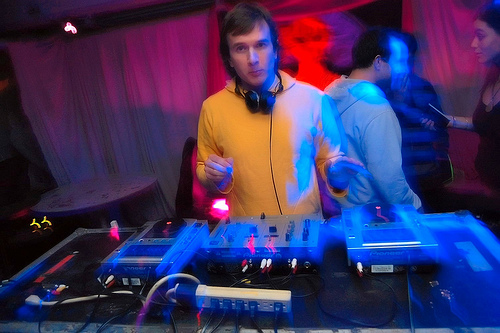Videos by American Songwriter
This photo is used under a Creative Commons Attribution license, courtesy of duziem on Flickr.
Share has become an important word in the Information Age. For musicians, especially, it’s become a bittersweet concept, as an artist’s main product (audio recording) has lent itself – because of its small file size – most rampantly to sharing. It’s created extreme devaluation of a product that the public used to buy like milk and eggs.
So, naturally, the idea of copyright has come to be thought of as a savior for the industry, but also as a threat to the consumer and what seems, in a lot of ways, to be the natural evolution of the internet. We’ve written a lot about copyright, from Michael Kosser’s “Street Smarts” column on what happens when someone challenges your copyright, to the recent negotiations for performance royalties for artists and labels. A few weeks ago, the New York Times Magazine did a provocative feature on BMI, which seemed to show an increasing divide between content creators and content users.
One thing that songwriters often neglect to realize is that every time they “write” a song – commit an idea to paper or record a demo – they’ve created a copyright of their work. It’s legally a copyright, but whether it will hold up in a court of law is another story. To really make your work official, you’ll want to register it with the U.S. Copyright Office. (In the old days, songwriters would write their lyrics on a piece of paper and mail it to their own house, and, in theory, the postmark would serve as a some sort of official something.)
But with the pace of technology these days, a lot of the old notions of copyright are being revisited. It’s also where the battle of “sharing” vs. “owning” is the most heated.
Back in 2001, a non-profit company called Creative Commons was founded to kind of refine the concept of the Public Domain in the Information Age. Creative Commons has created an alternative to the standard “all rights reserved,” because a lot of times an artist may very well want their ideas or works disseminated. Case in point – the mighty remix! In an informational video on their site, Creative Commons lays out their raison d’etre as such: “ [to] provide free copyright licenses you can use to tell people exactly which parts of your copyright you’re happy to give to the public.”
Recently, we’ve been big fans of SoundCloud, and now the German startup is making the remix legit through a partnership with Creative Commons.
SoundCloud’s player was already uniquely fitted out for commenting within the audio stream. A user, for example, can leave a note at the 1:34 mark in a song, such as, “I like it when the chorus starts here.” Such innovations have led to a collaborative spirit among SoundCloud users, so the partnership with Creative Commons is a logical step.
Now copyright owners can specify exactly how other content creators will use their work on SoundCloud, using a simple set of Creative Commons symbols to provide guidelines. The most inclusive license, Attribution, “lets others copy, distribute, display, and perform a copyrighted work – and derivative works based upon it – but only if they give credit the way the original creator requests.”
There are also symbols for Noncommercial, Share Alike, and No Derivative Works, which each have their own guidelines for use.
Visiting www.soundcloud.com/creativecommons brings up hundreds of songs that users have uploaded for sharing and collaborating based on the Creative Commons licenses. A random sampling included a pianist’s version of Scott Joplin’s “Maple Leaf Rag” (whose copyright has expired and is thus now within the Public Domain), a “field” recording from a Sydney subway train, and plenty of bedroom musicians’ gauzy, ambient jams.
The partnership with SoundCloud still presents plenty of opportunities for users who don’t want to play nice, and policing unlicensed uploads to YouTube and other audio and video hosting sites has become a massive enterprise. I found a few tracks with CC licenses that featured remixes of works, such as Depeche Mode’s “Enjoy the Silence,” that surely weren’t legally obtained.
At any rate, both Creative Commons and its integration with SoundCloud are well worth checking out for all content creators, especially musicians.













Leave a Reply
Only members can comment. Become a member. Already a member? Log in.